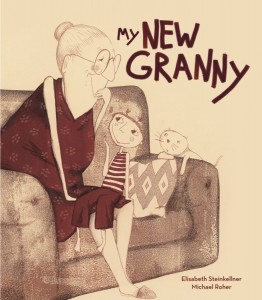 I don’t often do book reviews on Mondays, particularly of picture books, which are usually reserved for Fridays, but this one is special. Tomorrow, January 15th, will be the second anniversary of my Dad’s death. In the final two years of his life, we dealt with the difficult path of dementia — memory loss, confusion, and for him, the added agitation of Sundowner’s, in which the dementia becomes much more pronounced toward evening and overnight. No matter what kind or degree of dementia a loved one suffers from, it is wrenchingly hard for the family to see a formerly strong, independent person change so much. I know it was hard for me.
I don’t often do book reviews on Mondays, particularly of picture books, which are usually reserved for Fridays, but this one is special. Tomorrow, January 15th, will be the second anniversary of my Dad’s death. In the final two years of his life, we dealt with the difficult path of dementia — memory loss, confusion, and for him, the added agitation of Sundowner’s, in which the dementia becomes much more pronounced toward evening and overnight. No matter what kind or degree of dementia a loved one suffers from, it is wrenchingly hard for the family to see a formerly strong, independent person change so much. I know it was hard for me.
My New Granny by Elisabeth Steinkellner and Michael Roher is an excellent picture book that helps children understand what is happening when an elderly loved one begins to show signs of Alzheimer’s. I want to share this book with you today, as I remember my Dad, both as he used to be, and as he was in his final stages.
For a Perfect Picture Book Friday review of this book, please see Pat Tilton’s blog, Children’s Books Heal.
For my review, read on…
Title: My New Granny
Author: Elisabeth Steinkellner
Illustrator: Michael Roher
Translator: Connie Stradling Morby
Publisher: Originally published in Austria. Published in the United States by Sky Pony Press, New York, 2012
Audience Age: 4 to 8 years
Opening Sentences: My old Granny always made a fuss about my hairdo. “Fini, what have you done to your beautiful hair again?” she sighed and shook her head, not understanding.
Summary: The narrator, a young girl named Fini, talks about what her Granny used to be like, calling her “my old Granny.” Her Granny used to travel a lot, take her to the park, and cook wonderful exotic meals. Then in a few simple words, the reader learns But then Granny had to go to the hospital and came back as a new Granny. Granny and her family are now dealing with the early stages of Alzheimer’s, something that can be very difficult for children — or adults — to understand and cope with.
Through Fini’s eyes, we see all the changes in her Granny. Granny can no longer travel, she’d rather eat the stale bread crumbs herself than feed the ducks in the park, and after an incident in which she turns on all the stove burners to warm her hands, the once fabulous cook can no longer be trusted to be around the stove. We feel Fini’s bewilderment at her Granny’s behavior, her anger at having to watch Granny while her mother is out for a brief time, Fini’s mother’s fatigue and frustration at having such a responsibility thrust on her by her mother’s deterioration. These are all things any family who has dealt with dementia can relate to, but they’re told in a way that children can grapple with. Finally, a caregiver is hired to help out with Granny, and as the tension eases, Fini finds something she can do for her Granny that helps to bond them — she can do Granny’s hair on Sundays, and together they can admire themselves in the mirror. Truly, at this stage of life, such simple things are treasures.
Each double-page spread contains a brief block of simple text that is readily accessible to children in tone, meaning, and feeling. Most of each spread is given over to the simplistic but yet detailed sepia-toned illustrations, which do an excellent job of taking the story into the visual dimension. Often a spread will show, quite masterfully, the progression of the action, such as three Grannys sitting on the couch at the same time, depicting her listening to her granddaughter’s stories, and eventually falling asleep; or the caregiver’s various routines with the elderly woman. There is also a recurring appearance by a family of mice, whose participation in the action, such as holding a miniature firehose while Granny warms her hands at the stove, will both delight, and draw readers more deeply into the illustrations and thus, into the story.
I would highly recommend this book as a good one to share with children in a family where someone has recently been diagnosed with dementia, or even where the family has been dealing with the dementia for some time. It shows that reactions of frustration, anger, and compassion are normal, and would be a good starter for discussion.
My New Granny is available in hardcover or ebook versions.
This book has been provided to me free of charge by the publisher in exchange for an honest review of the work.

My Great-Grandfather can’t speak or get out of bed now. After Christmas he just kept getting worse and worse. I still go in and talk to him. I know he can hear me because he will open his eyes and sometimes smile. Our family is going through a hard time because he is this way and was always a very strong person before. He doesn’t have dementia, but he is very different. 🙁 I think this book could help a lot of kids.
Oh, Erik — I am so sorry to hear that your Great-Grandfather is getting worse, but I’m glad you’re still going in and talking to him. People can still hear you, long after they can’t do anything else, and I know it will mean so much to him that you are talking to him. I’ll be thinking of you and your family through this. Take care.
Thank you Ms. Stilborn!
I remember being very touched by it when Pat reviewed it, and again, now. I think the sepia tone is a very clever choice for the illustrations and love the mouse family inclusion. Hope the anniversary tomorrow is a peaceful one for you.
Thank you very much, Joanna.
This sounds like a beautiful book to read to children so they understand what can happen to grandparents as they get older. Thinking of you tomorrow Beth, take care!
It is, indeed, a great book to share with kids in this situation. Thank you for your thoughts, Catherine!
I’ll say a prayer for you Beth as you take your father’s memories into your special place of comfort tomorrow. I know your heart is full at this moment. This book sounds like a gentle tool for any reader dealing with this. THANK YOU SO MUCH, BETH!!!
Thanks so much, Pam. Last night I dreamed I was flying Dad’s plane, and he was standing on the ground beaming with pride. That helped.
Sounds like a gem of a book. It’ll certainly make it easier to explain to kids what happens as people age. Sending you warm prayers as you commemorate your father’s life.
Nutschell
http://www.thewritingnut.com
Thank you so much, Nutschell — it is indeed a gem of a book.